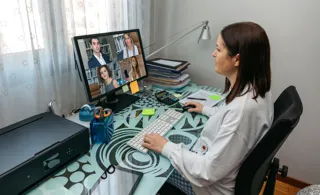Businesses must work on cultural change not simply introduce quotas to improve gender diversity, according to a number of automotive industry leaders.
Daksh Gupta, chief executive of Marshall Motor Holdings, Catherine Faiers, chief operating officer of Auto Trader and Elizabeth Hill, chief engineer at Jaguar Land Rover (JLR), all spoke about their concerns around quotas during a Deloitte Women at the Wheel webinar, following Deloitte’s 2020 Women in Automotive UK study, which found women feel under-represented in automotive leadership roles.
Faiers said: “The risk with quotas is that people jump to the ‘end game’ and you try and focus on external hires, and, in particular, senior external hires, and then you end up making the numbers look good.
“But, actually, if you haven't driven the cultural or organisational change that you need to build a business over the long term with better gender balance then I'm not sure that quotas actually get you very far.”
Gupta said that change needed to come from grassroots level and he was “not keen on quotas”.
“I would hate to think the only reason I got my role is because I’ve come from an ethnic background,” he said. “I think it’s important that you’ve got the role because you’re good enough.”
Hill agreed: “If I ever felt like I got promoted because somebody was trying to fulfil a quota that would upset me because I want it to be around me and my achievements.”
However, she acknowledged that quotas could be useful in providing a structure to make a “step change”.
Strategies for achieving change
Auto Trader has been trying to achieve gender balance for more than five years and its plc Board is now 50% women, and around 40% of its leadership team are women, up from just over 30%.
“Our target has clearly got to be to reach 50% (of leadership roles) at some point in the future but we’re actually quite committed to taking our time to get there because our experience has been if you get all the foundations and all the practices, programmes, policies and get the culture right then you’ll get there ultimately,” Faiers said.
The business has taken a “data-led approach” to achieving change.
As FTSE 100 company it has to report its gender pay gap annually but it also looks at gender balance for people joining and leaving the company, promotions and pay rises on a monthly basis.
“It enables much better conversations and it becomes obvious where you need to change things and in which parts of the organisation we’re not getting the right balance,” Faiers said.
However, what has had the most impact, according to Faiers, has been Auto Trader’s women’s network, as it was founded by women in the organisation not something that the leadership team mandated.
Hill agreed that networks can be effective and highlighted the importance of having male "allies".
"I think it's important to invite allies in and one of the things the team did to set up the women engineering network was actually change it to 'women in engineering and allies' because we realised it would look like we just want women in engineering, and actually we know that it's not about lots of women getting together, it's about trying to change that approach and that culture," she said.
At Marshall’s, 31.7% of its plc, operating Board and senior functional heads are women, up from 15% in 2015.
Gupta emphasised the importance of recruitment, training and company culture.
Changing Marshall’s renumeration package and introducing a two-week residential training course for new recruits has both increased female applicants and improved retention.
It has also seen improvements in its diversity scores for the Great Place to Work Institute.
“Our approach has been to ‘grow our own’ (female talent),” Gupta said. “We have a future leaders programme which we launched six years ago. When we started we only had one woman and this year 12 out of 20 are women.”
The business has also benefited from greater customer satisfaction by employing women, according to Gupta.
“We handle 1.2 million customers and sell around 130,000 cars and when you’ve got a business like that we do get things wrong,” he said.
“People do write to me and I can honestly say I never get complaints about any female sales staff.”
Hill added that there is now “a lot more awareness of the commercial benefit of diversity” but businesses are also now looking for different skills, particularly with the growth of online sales, and that will bring further change.
- Women at the Wheel is holding an online event to celebrate International Women’s Day today (March 8) from 5.30pm to 7.30pm, with a workshop led by Sally Fisher, founder and director of Ah-Ha. Register here.



















Login to comment
Comments
No comments have been made yet.